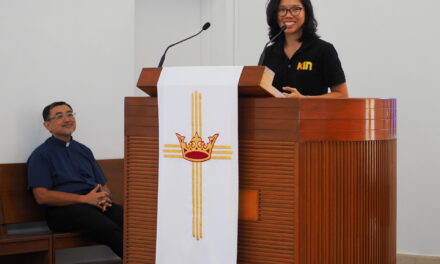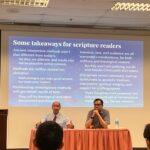
The Resurrection of Jesus:
An Optional Extra?
By Dr Leow Theng Huat
Lecturer in Theology

“I began to realise that the root of the problem lay with my understanding of the gospel.”
Puzzlement over Jesus’ Resurrection
We celebrated Easter Sunday a short while ago. This is therefore an appropriate juncture for me to make a confession: For the first decade or so of my life as a Christian, I did not know what to make of the resurrection of our Lord Jesus Christ.
Sometimes, when we download a piece of software into our computers, we are presented with the choice to install supplementary programmes. These are not essential to the operation of the main software, but might be useful to have in certain circumstances. These supplementary programmes might be called “optional extras”. For a long time, the resurrection of Jesus constituted something of an “optional extra” to my Christian faith.
The reason for this is simple. I had embraced a version of the gospel (or good news) of Christianity which went something like this: “Because of sin, we human beings are guilty in God’s sight and are destined for the punishment of hell. Out of his grace, God has sent his Son Jesus Christ into our world. Jesus died on the cross, where he paid the penalty for our sin and also transferred to us his righteousness. All those who acknowledge Jesus as their Lord and Saviour obtain the salvation won by him at the cross, and our spirits have a place in heaven when we die.” One searches in vain for any mention of Jesus’ resurrection in this gospel account. Indeed, for a long while, I wondered about the purpose for this resurrection. Hasn’t the penalty of our sin already been paid on the cross? Hasn’t the righteousness of Jesus already been transferred to those who have faith in him as a result of what happened on Calvary? Isn’t the cross sufficient to fulfil the mission of Jesus to save us from our sins? What is the point of the resurrection? Is it merely to provide a satisfactory conclusion to the narrative of Jesus’ life; a “good ending” to the story; a kind of icing on the cake?
My sense of puzzlement increased when I read the Bible more thoroughly, and discovered that it proclaimed quite clearly the indispensability of Jesus’ resurrection for the Christian faith. The apostle Paul, for example, states rather emphatically in 1 Cor 15 that “if Christ has not been raised, our preaching is useless and so is your faith” (v. 14) and “if Christ has not been raised, your faith is futile; you are still in your sins” (v. 17). All these do not sound like the description of an “optional extra”.
Things became even more incongruous when I observed that, in many churches, the service on Easter Sunday was the grandest one of the whole year, often overshadowing the Good Friday service. Some churches would have a “combined Easter service” with different congregations gathering to worship together and translation services provided. Others would put up banners and other special decorative pieces to adorn the church building. Yet other churches would assemble a band, choir or drama team to put up special items for the service. For the Roman Catholic churches, Eastern Orthodox churches and Protestant churches which retain the traditional practice, what is called the “Easter Virgil” is the most elaborate and important service in the entire liturgical year, involving the lighting of candles, extensive Scripture readings, the administration of the sacrament of baptism and numerous other carefully performed rituals. I was confused: Why do we go to such lengths just to celebrate an “optional extra”?
A Deeper Understanding of the Gospel
Thankfully, my puzzlement and confusion received a sort of resolution when I embarked on my theological studies at Trinity Theological College. Under the guidance of wise and competent teachers and with the help of my fellow students, I began to realise that the root of the problem lay with my understanding of the gospel. The account I gave above is not wrong, because it describes accurately the miracle of what Protestant Reformer Martin Luther calls the “wondrous exchange” which took place on the cross. It also serves well as a simple introduction to Christianity for those who are unfamiliar with the faith. But this account is simply inadequate for the long run. It does not include as integral to the good news many other critical elements of the faith, e.g., creation, the triune God, the two-natures of Jesus Christ, the Church and her sacraments, the last things and, of course, the resurrection of Jesus. In fact, the various “doctrines” we study in a typical course on Christian theology are simply an explication of the good news which our Christian faith proclaims.
Moreover, the more one probes into this gospel, the more we are led to see that it goes so deep and extends so wide that we will never fully plumb its depths and traverse its breadth, even throughout eternity. The good news about who our God is and what he has done for us is so marvelous that there will always be fresh perspectives to discover and new things to praise our gracious God for. We sometimes imagine heaven to be a (frankly) boring place, where we do nothing but strum our harps all day. The Christian view of heaven is quite the opposite: It will be an exciting journey of never-ending discoveries of God and his love for us.
Coming back to Jesus’ resurrection, I am thankful that the notion that it is an “optional extra” has been firmly thrown out of the window, now that I have a better understanding of the gospel and the critical place of the resurrection in it. The Bible passages which proclaim the indispensability of Jesus’ resurrection for our faith now appear more comprehensible, and the extensive efforts which many churches put into making the Easter service an especially elaborate one seem fully justified.
Are you curious about what I (and many others) have discovered about the Christian gospel? One way to find out more is to undertake a stint of theological education. This can range from committing a few years of your life to obtaining a theological degree to attending the occasional day or evening course which TTC and other seminaries regularly offer.
This being TTC’s 70th Anniversary, I will close by sharing about the aspect of the college’s ministry I am most thankful for. In these 70 years, TTC has made important contributions to the life of the Church in many key areas. One such contribution which I am particularly grateful for is its constant challenge to Christians to continually probe the depth and width of our gospel and to communicate its surprising wonder and life-changing power to others. May we never cease from this exciting journey of discovering who God is and what he has done for us.









